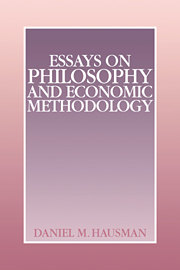Book contents
- Frontmatter
- Contents
- Introduction: What is philosophy of economics?
- PART I METHODOLOGY AND THEORY APPRAISAL
- PART II CAUSALITY IN ECONOMICS
- 9 Are there causal relations among dependent variables?
- 10 Classical wage theory and the causal complications of explaining distribution
- 11 Supply and demand explanations and their ceteris paribus clauses
- PART III CASES AND PUZZLES
- PART IV POSTSCRIPTS
- Bibliography of relevant writings by Daniel M. Hausman
- Bibliography of works by other authors
- Index
10 - Classical wage theory and the causal complications of explaining distribution
Published online by Cambridge University Press: 05 June 2012
- Frontmatter
- Contents
- Introduction: What is philosophy of economics?
- PART I METHODOLOGY AND THEORY APPRAISAL
- PART II CAUSALITY IN ECONOMICS
- 9 Are there causal relations among dependent variables?
- 10 Classical wage theory and the causal complications of explaining distribution
- 11 Supply and demand explanations and their ceteris paribus clauses
- PART III CASES AND PUZZLES
- PART IV POSTSCRIPTS
- Bibliography of relevant writings by Daniel M. Hausman
- Bibliography of works by other authors
- Index
Summary
INTRODUCTION
For at least half a century classical political economists were largely in agreement on wage theory. The demand for labor was determined by the so-called wage fund or wages fund, while Malthusian population theory accounted for the supply of labor. Classical wage theory attempted to explain wages in a given period, to identify those factors which would influence the trend of wages over time and to account for the eventual level of subsistence wages in the approaching “stationary state” in which economic growth would cease.
Modern economists have repudiated virtually all of classical wage theory. They no longer regard the supply of labor as determined by the responsiveness of the laboring population to sub- or super-subsistence wages. Nor do they accept the existence of a wage fund. Instead they subscribe for the most part to a marginal productivity theory of demand for labor and to more complicated theories of the supply of labor. Although I do not want to defend classical wage theory, I think that there are some interesting methodological lessons to be learned from it and that the marginal productivity theory which succeeded it, considered as a theory of average wages and of the distribution of income, is no improvement. As we shall see, there are formidable difficulties in the path of any (causal) explanation of the distribution of income. We shall also see that, in constructing and assessing explanations in economics, it is important to pay attention to the causal structure of such explanations.
Information
- Type
- Chapter
- Information
- Essays on Philosophy and Economic Methodology , pp. 129 - 146Publisher: Cambridge University PressPrint publication year: 1992
